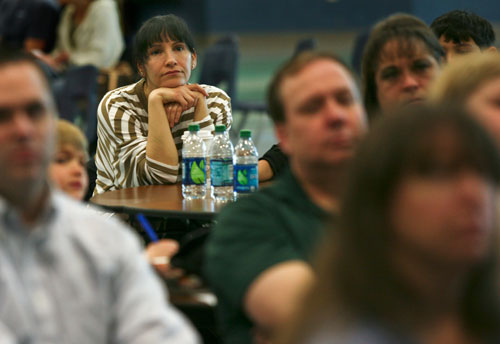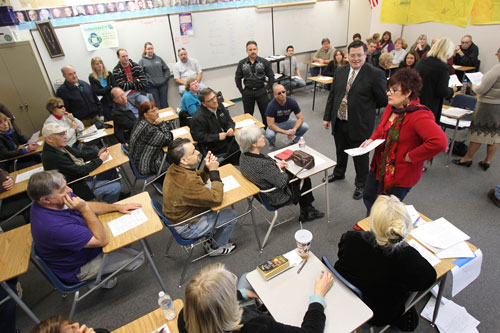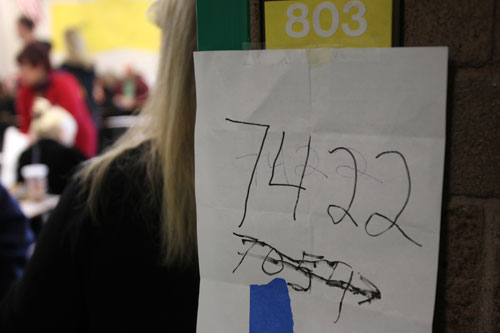Republican officials offer reasons for low turnout in caucuses
William Crapia had one question Monday when he read the news that Mitt Romney had won Nevada's Republican presidential caucuses over the weekend: "Is it over?"
Crapia, 84, said he and his wife, Carole, 75, didn't know Republicans were holding a caucus Saturday until the party meetings and the voting were long over.
"I feel cheated," he said. "I thought they were going to send an absentee ballot in the mail."
At the same time, an unknown number of Republicans, such as Robert Dinkins, 75, showed up late. Dinkins missed the chance to vote for his GOP presidential favorite, Newt Gingrich.
"We tried to vote," said Dinkins, who explained that he, his wife and his son were among two dozen Republicans turned away from a Centennial High School caucus site. They arrived at 11:30 a.m., too late to participate in the Clark County GOP meetings, which began at 9 a.m. and ended an hour or so later.
Party officials and the presidential campaigns attributed low turnout in Saturday's caucuses to misunderstandings, the lack of a major GOP publicity drive ahead of the meetings and the feeling among Republicans that the big winner Romney had it wrapped up with little real competition.
Only 32,894 Republicans participated in the GOP caucuses, 26 percent less than the 44,324 who caucused in 2008. Romney won half of the caucus-goers' support both years. The total Republican turnout Saturday was 8.2 percent of the 400,310 registered Republicans across the state.
The Nevada Democratic Party said the lackluster GOP interest points to an "enthusiasm gap" that will make it easier for President Barack Obama to win the Silver State and re-election in November.
Republicans, in turn, point to light turnout in the Jan. 21 Democratic caucuses in Nevada to argue that there's little enthusiasm for Obama. About 12,600 Democrats attended the caucuses to support the president as their uncontested Democratic pick, far fewer than the 116,000 in 2008 who caucused.
Both parties have nine months until the general election Nov. 6 to find out who is right as Obama takes on the eventual GOP nominee, most likely Romney unless there is a Republican upset.
It was clear from Saturday's GOP meetings that Nevadans aren't used to holding presidential caucuses that matter -- and that most don't understand how they work. The GOP precinct meetings started at a specific time -- 9 a.m. in Clark County -- to discuss candidates, elect delegates and cast presidential ballots. Only Carson City let Republicans "vote and go" before the caucus meeting.
Making things worse, the Nevada Republican Party and the Clark County GOP did a poor job of promoting the caucuses -- not sending mailers to homes or running TV ads, for example.
Dave Gibbs, chairman of the Clark County Republican Party, said he had estimated turnout would be 30,000 in the state's largest county instead of the 16,994 who showed up. The state party had estimated as many as 70,000 would participate, more than double the number who did.
"It was a disappointment," Gibbs said. "I think a lot of people didn't come because they thought it's already Romney's. And there was some confusion. We needed to do more to get out the word, but we didn't have the money. We need to take a look at how we did it and do better."
Both the state and the Clark County GOP had websites that provided information about how to register and where the 1,800 precinct meetings were being held and when.
But the party relied mostly on emails and social media to spread the word. Phone calls also were made to Republicans. And GOP Gov. Brian Sandoval recorded an automated phone message urging Republicans to turn out.
That didn't help Crapia, who said he thought Nevada was going to have a presidential primary -- something it has rarely done in the past. He said he has lived in Nevada since 1996, which was the last time the Republican Party held a preferential primary election here. Nevada Democrats haven't held a presidential primary since 1976 and 1980, years when both parties held primary elections.
The state runs primary elections, which can be costly and are paid for by taxpayers instead of the political parties. The 1996 GOP primary had a price tag of more than $500,000.
"When I seen all that about people going and voting in a caucus and some people getting locked out, I thought, 'Well, that's for the birds,' " said Crapia, a Gingrich supporter who nonetheless said he would vote for the likely GOP nominee in the fall. "So we have to vote for Romney now."
Dinkins, who served as a Marine, said he tried to insist on voting at Centennial High School.
"The guy told me I was intimidating," Dinkins said. "Well, that's pretty good at 75. I blame the Republicans. They can call me and ask me for money, but they can't call me to tell me when to vote?"
Before 2008, Nevada's presidential caucuses were mostly quiet affairs with a low number of party regulars choosing delegates for the Democratic and Republican nominating conventions.
Four years ago, that changed as Nevada won a spot among early voting states, going after Iowa and New Hampshire and on the same day as South Carolina. The highly contested Democratic battle between Obama and Hillary Clinton helped the party register 100,000 new voters.
Ryan Erwin, a senior Nevada adviser for Romney, said he wasn't worried about the low turnout because each election cycle has its own dynamics. On Saturday, Romney won 50 percent of the ballots, 16,486 votes. That number is fewer than four years ago, when he got 51 percent with 22,649 votes.
Erwin said that holding the GOP caucuses on a different day than the Democratic caucuses may have suppressed turnout compared with 2008, when Nevada was swarmed for months with presidential candidates. Saturday's GOP contest came fours days after Florida's high-stakes primary on Jan. 31, leaving the four final contenders little time to campaign in the Silver State.
Romney has campaigned fairly often in Nevada while Rep. Ron Paul of Texas has a loyal following in the state. Neither Gingrich nor Rick Santorum had much time to organize supporters to caucus.
"It didn't get a lot of publicity until down the stretch," Erwin said of the GOP caucuses. "We certainly had people call and say you don't need my vote anyway. I said yes we do."
Carl Bunce, Nevada chairman of the Paul campaign, seemed nonplussed by the low turnout. He had predicted a first- or second-place finish for Paul, who ended third with 19 percent of the vote behind Gingrich, who won 21 percent. Santorum was last with 10 percent.
"The apathy among our voter base is pretty disturbing," Bunce said. "I don't know why."
Contact Laura Myers at lmyers@reviewjournal.com or 702-387-2919. Follow @lmyerslvrj on Twitter.




















